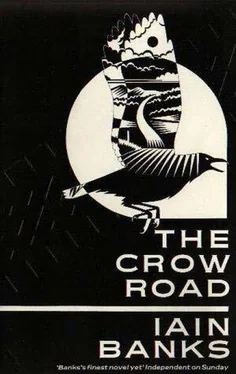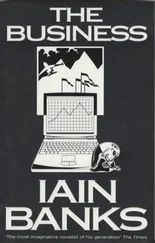Iain Banks - The Crow Road
Здесь есть возможность читать онлайн «Iain Banks - The Crow Road» весь текст электронной книги совершенно бесплатно (целиком полную версию без сокращений). В некоторых случаях можно слушать аудио, скачать через торрент в формате fb2 и присутствует краткое содержание. Год выпуска: 1992, Жанр: Современная проза, на английском языке. Описание произведения, (предисловие) а так же отзывы посетителей доступны на портале библиотеки ЛибКат.
- Название:The Crow Road
- Автор:
- Жанр:
- Год:1992
- ISBN:нет данных
- Рейтинг книги:5 / 5. Голосов: 1
-
Избранное:Добавить в избранное
- Отзывы:
-
Ваша оценка:
- 100
- 1
- 2
- 3
- 4
- 5
The Crow Road: краткое содержание, описание и аннотация
Предлагаем к чтению аннотацию, описание, краткое содержание или предисловие (зависит от того, что написал сам автор книги «The Crow Road»). Если вы не нашли необходимую информацию о книге — напишите в комментариях, мы постараемся отыскать её.
The Crow Road — читать онлайн бесплатно полную книгу (весь текст) целиком
Ниже представлен текст книги, разбитый по страницам. Система сохранения места последней прочитанной страницы, позволяет с удобством читать онлайн бесплатно книгу «The Crow Road», без необходимости каждый раз заново искать на чём Вы остановились. Поставьте закладку, и сможете в любой момент перейти на страницу, на которой закончили чтение.
Интервал:
Закладка:
"Shit, that's the door. What?"
The breath sighed out of me. "Ah… nothing. Take care, Ash."
"Yeah, you too, bye."
I put the phone down, put my head back, looked up at the plaster stalagtites that formed the ceiling frieze in the study of the Ippot house, and howled like a dog.
The Strathclyde Police received a telephone tip-off at their headquarters in Glasgow that a drug ring was using Loch Coille Bharr — just south of the Argyllshire village of Crinan — as a hiding place for cocaine, at 1325 on January the 23rd. The tip-off was quite specific, talking of weighted, water-tight plastic cylinders towed behind yachts coming from the Continent and transferred to the loch to await pick-up by dealers from Glasgow. The loch was cordoned off that day and police divers started searching the south end of the loch the following morning, while policemen in small boats used grappling hooks to drag the rest.
No drug-packed cylinders were ever found, but on the second day one of the boats snagged something heavy. A diver went down to free the line from what was expected to be a water-logged tree.
He surfaced to report that the line had hooked onto the rear wheel of a motor-bike which had, tied to it, the remains of a body.
The bike and the body were brought to the surface that evening. The corpse had decomposed and been eaten by fish, to the point of being a skeleton held together more by the clothes it still wore than by the few pieces of connective tissue left. The clothes suggested the deceased had been a male, but the police weren't sure of the skeleton's sex until the body was examined in Glasgow the following day.
What they did know was that the bike — a Suzuki 185 GT registered in 1977 — had been reported stolen by its owner in Glasgow in 1981, after it had been loaned to a friend and never returned. Probably that alone would have led to the police coming to Lochgair to see us, but one of the local policemen with a long memory had already put two and two together when he'd heard the make and model of the bike.
The corpse carried no identifying papers, but dental records matched. We knew then it was Rory.
The skeleton had been found wearing a crash-helmet, but it must have been put back on after Rory had been murdered; according to the pathologist's report, he'd been killed by a series of blows to the back of the head with a smooth, hard, spherical or nearly spherical object, approximately nine centimetres in diameter. He was probably unconscious after the first blow.
And so, after the coroner had released the remains following the inquest in late February, Uncle Rory's bones came back to Lochgair at last, and were laid to rest at the back of the garden, under the larches, between the rhododendrons and the wild roses, at the side of his brother. The stone-mason added Rory's name and dates to the black granite obelisk, and we held a small ceremony just for the immediate family and Janice Rae. It fell to me to read out the words Rory had, apparently, intended to close Crow Road with, by way of a funeral oration.
The passage came from Rory's nameless play, and began: "And all your nonsenses and truths…»
Janice cried.
I remarked to Lewis that the way things were going in our family it might work out cheaper in the long run if we bought our own hearse.
I do believe he was shocked. Or maybe he just wished he'd said it.
Technically the case remained open and Rory's murderer was still being sought, but beyond briefly interviewing mum, Janice and Rory's old flat-mate Andy Nichol, the police took no further action. I never did find out just how good at adding-up that policeman was.
The firm Ashley Watt was working for in London went into receivership in the last week of January. She was made redundant, but remained in the city looking for another job.
The war ended, in a famous victory. Only their young men died like cattle, and there was even talk of the US making a modest profit on the operation.
Verity's baby was born — bang on time — on March the 2nd, in London, in a warm birthing pool in a big hospital. The boy was registered as Kenneth Walker McHoan; he weighed three and a half kilos and looked like his father.
Lewis, Verity and young Kenneth travelled up to Lochgair two weeks later.
The lawyer Blawke read Fergus Urvill's will in Gaineamh Castle on the 8th of March. I had been asked to be present, and travelled down by train — the Golf was in for a service — with feelings of bitterness and dread.
Helen and Diana, solemnly beautiful in black, both looking tanned — Helen from Switzerland, Diana from Hawaii — sat together in the tall-ceilinged Solar and heard that they were to inherit the estate, with the exception of various pieces of glass held in the castle, which — as the twins had already known — were to be donated to the Glass Museum attached to the factory. Mrs McSpadden — sitting hunched and crying with what was, in retrospect, a quite baffling quietness — received the sum of twenty-five thousand pounds, and the right either to live on in the castle, or receive a similar amount if the property was sold or if she was asked to vacate her apartments by the twins or their heirs. Fergus had asked to be buried in the old castle garden, but as they never did recover the body a monument was decided on instead. A memorial service would he held in Gallanach at a later date.
The Range Rover was part of the estate, but the Bentley Eight had been willed to my father. Fergus had changed his will after dad's death — following promptings by the good lawyer Blawke — and so the car and its contents passed to me instead, which came as something of a surprise.
There were various other bits and pieces — bequests to charities and so on — but that was the gist of it.
The lawyer Blawke handed me the keys to the Bentley after the reading, while we were standing around awkwardly drinking small sherries dispensed by a quietly tearful Mrs McSpadden and I was still in a slight daze, thinking, What? Why? Why did he give me the car?
I talked to the twins. Helen just wanted to get away, but Diana had decided to stay on for a while; I agreed to come and help her pack stuff away in a few days time. Fergus's personal effects were going to be stored in the cellar, and of course the glass had to be packed up to be taken to the museum. The twins said they still hadn't decided what to do with the castle long-term, and I got the impression it depended on what Mrs McSpadden chose to do.
I said my good-byes as soon as I decently could. I had intended to take mum's Metro straight back to Lochgair; I'd told Helen and Diana that I'd probably come back that afternoon with mum, to take the Bentley away. But for some reason, when I got out of the castle doors, I didn't go crunching over the gravel to the little hatchback but turned and went back into the Solar and asked if I could take the Bentley to Lochgair instead, and come back for the Metro later.
Diana told me the garage was open, so I walked round to the rear of the castle where the garage and outhouses were. The Bentley sat inside the opened double garage, burgundy bodywork gleaming like frozen wine. I opened the car, wondering why the will had mentioned the contents of the Eight as well as the vehicle itself.
I got in and sat in that high armchair of a driver's seat, smiling at the walnut and the chrome and breathing in the smell of Connelly hide. The car looked showroom-clean; un-lived in. Nothing in the door pockets, on the back seats or the rear shelf; not even maps. I hesitated before opening the glove box. I was just paranoid enough to think maybe there was a bomb wired to that or the ignition, but, well, that didn't seem very Fergus-like, despite it all. So I opened the glove box.
Читать дальшеИнтервал:
Закладка:
Похожие книги на «The Crow Road»
Представляем Вашему вниманию похожие книги на «The Crow Road» списком для выбора. Мы отобрали схожую по названию и смыслу литературу в надежде предоставить читателям больше вариантов отыскать новые, интересные, ещё непрочитанные произведения.
Обсуждение, отзывы о книге «The Crow Road» и просто собственные мнения читателей. Оставьте ваши комментарии, напишите, что Вы думаете о произведении, его смысле или главных героях. Укажите что конкретно понравилось, а что нет, и почему Вы так считаете.












